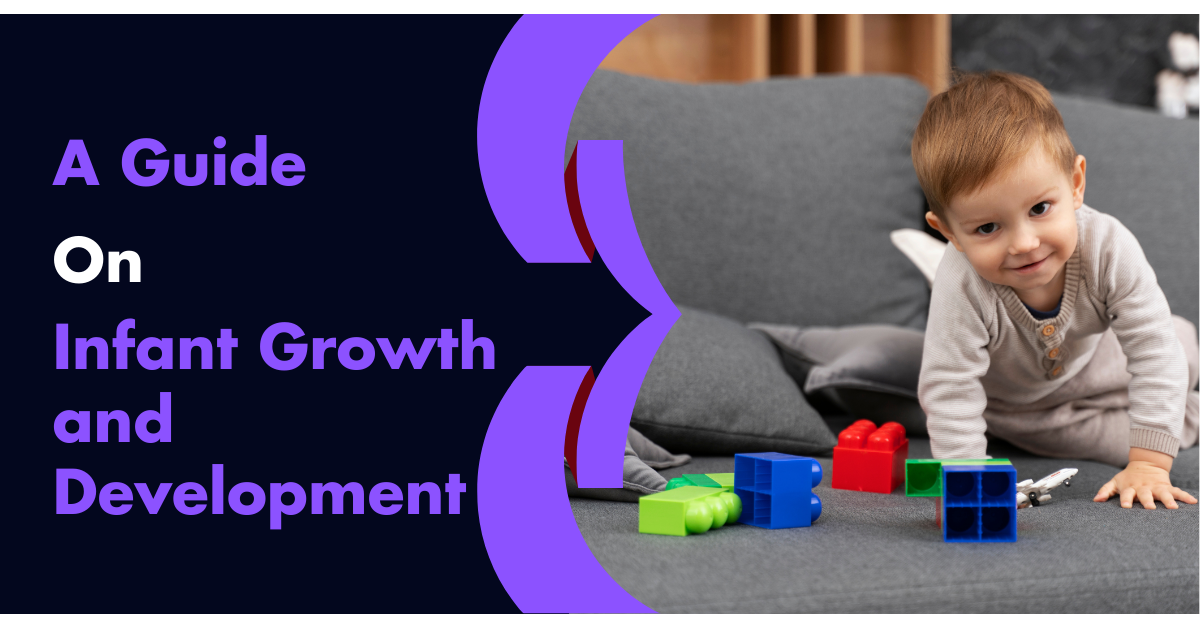Welcoming a baby into your family is one of life’s most joyful experiences. Along with the happiness, parents often wonder if their child is growing and developing at the right pace. Understanding infant growth and development can help parents track progress, celebrate milestones, and seek guidance when needed.
This article provides an easy-to-understand explanation of the basics of infant growth and development.
Why Infant Growth and Development Matters?
Infant growth and development refers to the physical, emotional, cognitive, and social changes that occur during the first years of life. Tracking these milestones is important because:
- It ensures your baby is growing at a healthy rate.
- It helps detect developmental delays early.
- It guides parents in providing the right nutrition and care.
- It builds confidence in understanding a baby’s needs.
Key Areas of Infant Growth and Development
It is very important to know the key areas of infant growth and development for parents. Parents need to help their child in their development journey for proper development in children. Let us look at some of the key areas of infant growth:
1. Physical Growth
- Babies usually double their birth weight by 6 months and triple it by their first birthday.
- Head size grows rapidly to support brain development.
- Rolling over, crawling, and walking are major physical milestones.
2. Cognitive Development
- By 2 to 4 months, babies begin to recognize faces and respond to sounds.
- Around 6 months, they start understanding cause-and-effect (like shaking a rattle).
- By 12 months, many infants can say a few words and follow simple instructions.
3. Emotional and Social Development
- Smiling typically begins around 6 to 8 weeks, indicating early social interaction.
- Babies develop attachment with caregivers and may show stranger anxiety around 8–9 months.
- By 1 year, infants enjoy interactive games like peek-a-boo.
4. Language Development
- Cooing begins around 2 months.
- Babbling (da-da, ma-ma) usually starts by 6–9 months.
- By 12 months, some infants may say their first words.
Factors Influencing Infant Growth and Development
Every parent dreams of seeing their baby grow healthy, active, and happy. But did you know that many factors play a role in how quickly and smoothly a baby reaches their milestones? Infant growth and development is influenced by a mix of biological, environmental, and social factors. Understanding these can help parents provide the best care for their child.
1. Genetics
A baby’s genetic makeup, inherited from parents, sets the foundation for growth. For example, if both parents are tall, the child is more likely to be taller. Similarly, certain developmental traits such as the timing of walking or speaking can also have genetic links.
2. Nutrition
Nutrition is one of the most important factors in infant growth and development.
- First 6 months: Breast milk or formula provides essential nutrients.
- After 6 months: Introducing healthy solid foods supports growth and brain development.
- Deficiency of key nutrients like iron, vitamin D, or protein can slow growth.
3. Health and Medical Care
Regular pediatric checkups, timely vaccinations, and treatment of illnesses ensure babies grow without interruption. Frequent infections, untreated health issues, or lack of medical care can affect both physical and mental development.
4. Environment
The surroundings where a child grows also influence development.
- Clean, safe spaces encourage crawling, standing, and walking.
- Exposure to smoke, pollution, or unsafe conditions can negatively impact health.
- A stimulating environment with toys, colors, and interactions helps brain growth.
5. Parental Care and Bonding
Love, attention, and secure attachment are vital for emotional and social development. Babies who receive consistent affection and responsive caregiving are more confident, learn faster, and develop stronger social skills.
6. Sleep
Infants need a lot of sleep — around 14–16 hours a day in the early months. Sleep supports brain growth, memory, and emotional stability. Poor sleep patterns or disturbances can affect mood and development.
7. Physical Activity and Stimulation
Simple activities like tummy time, play, and gentle movement encourage muscle strength and motor skills. Lack of stimulation may delay milestones like crawling or walking.
8. Socioeconomic Factors
Access to healthcare, nutrition, and education also influence growth. In India, for example, families with better access to medical facilities and nutritional food see healthier growth patterns in children compared to underserved areas.
9. Cultural Practices
Cultural beliefs and practices — such as traditional foods, massage routines, or childcare styles — can impact growth. For instance, in many Indian households, regular oil massage is believed to strengthen bones and muscles.
Tips for Supporting Infant Growth and Development
- Nutrition: Breast milk or formula in the first 6 months, followed by solid foods after 6 months.
- Playtime: Encourage tummy time, interactive games, and safe exploration.
- Communication: Talk and sing to your baby to boost language skills.
- Routine Checkups: Regular pediatric visits help track growth and milestones.
- Love and Care: Physical affection and bonding build emotional security.
When to Consult a Pediatrician?
Every baby develops at their own pace, but consult your pediatrician if:
- Your baby isn’t smiling by 3 months.
- Cannot roll over by 6 months.
- Shows no babbling or response to sounds by 9 months.
- Has difficulty sitting or standing with support by 12 months.
Early detection helps address any delays effectively.
Simplify parenting with our app.
Click on This Link

How KidsCur Can Help?
Understanding infant growth and development helps parents feel confident and prepared during their baby’s first year. Each milestone — whether it’s a smile, first step, or first word — is a sign of progress. While every child grows at their own pace, regular care, love, and medical guidance ensure a healthy journey through our KidsCur app. Download the app to make your parenting journey more effective.
FAQs
What is normal infant growth in the first year?
Most babies double their birth weight by 6 months and triple it by 12 months, but small variations are normal.
When do babies usually start walking?
Most infants begin walking between 12–15 months, though some may start earlier or later.
How can I support my baby’s brain development?
Engage with your baby through talking, singing, reading, and interactive play to stimulate learning and bonding.
Are developmental delays common?
Some delays may happen, but early checkups and interventions help address them effectively.
How important are regular checkups for infant development?
Very important — pediatric visits help track growth, provide vaccinations, and ensure your baby’s development is on the right path.

